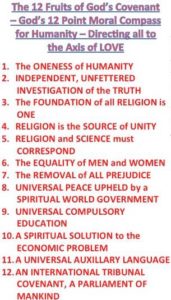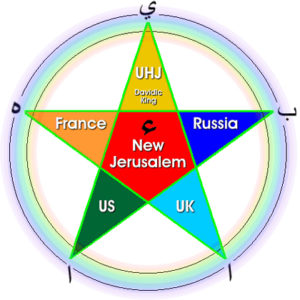Afterwards, the companions and disciples of Jesus asked Him concerning those signs that must needs signalize the return of His manifestation. When, they asked, shall these things be? Several times they questioned that peerless Beauty, and, every time He made reply, He set forth a special sign that should herald the advent of the promised Dispensation. To this testify the records of the four Gospels.
This wronged One will cite but one of these instances, thus conferring upon mankind, for the sake of God, such bounties as are yet concealed within the treasury of the hidden and sacred Tree, that haply mortal men may not remain deprived of their share of the immortal fruit, and attain to a dewdrop of the waters of everlasting life which, from Baghdád, the “Abode of Peace,” are being vouchsafed unto all mankind. We ask for neither meed nor reward. “We nourish your souls for the sake of God; we seek from you neither recompense nor thanks.” This is the food that conferreth everlasting life upon the pure in heart and the illumined in spirit. This is the bread of which it is said: “Lord, send down upon us Thy bread from heaven.” This bread shall never be withheld from them that deserve it, nor can it ever be exhausted. It groweth everlastingly from the tree of grace; it descendeth at all seasons from the heavens of justice and mercy. Even as He saith: “Seest thou not to what God likeneth a good word? To a good tree; its root firmly fixed, and its branches reaching unto heaven: yielding its fruit in all seasons.”
O the pity! that man should deprive himself of this goodly gift, this imperishable bounty, this everlasting life. It behooveth him to prize this food that cometh from heaven, that perchance, through the wondrous favors of the Sun of Truth, the dead may be brought to life, and withered souls be quickened by the infinite Spirit. Make haste, O my brother, that while there is yet time our lips may taste of the immortal draft, for the breeze of life, now blowing from the city of the Well-Beloved, cannot last, and the streaming river of holy utterance must needs be stilled, and the portals of the Riḍván cannot forever remain open. The day will surely come when the Nightingale of Paradise will have winged its flight away from its earthly abode unto its heavenly nest. Then will its melody be heard no more, and the beauty of the rose cease to shine. Seize the time, therefore, ere the glory of the divine springtime hath spent itself, and the Bird of Eternity ceased to warble its melody, that thy inner hearing may not be deprived of hearkening unto its call. This is My counsel unto thee and unto the beloved of God. Whosoever wisheth, let him turn thereunto; whosoever wisheth, let him turn away. God, verily, is independent of him and of that which he may see and witness.
These are the melodies, sung by Jesus, Son of Mary, in accents of majestic power in the Riḍván of the Gospel, revealing those signs that must needs herald the advent of the Manifestation after Him. In the first Gospel according to Matthew it is recorded: And when they asked Jesus concerning the signs of His coming, He said unto them: “Immediately after the oppression of those days shall the sun be darkened, and the moon shall not give her light, and the stars shall fall from heaven, and the powers of the earth shall be shaken: and then shall appear the sign of the Son of man in heaven: and then shall all the tribes of the earth mourn, and they shall see the Son of man coming in the clouds of heaven with power and great glory. And he shall send his angels with a great sound of a trumpet.” Rendered into the Persian tongue, the purport of these words is as follows: When the oppression and afflictions that are to befall mankind will have come to pass, then shall the sun be withheld from shining, the moon from giving light, the stars of heaven shall fall upon the earth, and the pillars of the earth shall quake. At that time, the signs of the Son of man shall appear in heaven, that is, the promised Beauty and Substance of life shall, when these signs have appeared, step forth out of the realm of the invisible into the visible world. And He saith: at that time, all the peoples and kindreds that dwell on earth shall bewail and lament, and they shall see that divine Beauty coming from heaven, riding upon the clouds with power, grandeur, and magnificence, sending His angels with a great sound of a trumpet. Similarly, in the three other Gospels, according to Luke, Mark, and John, the same statements are recorded. As We have referred at length to these in Our Tablets revealed in the Arabic tongue, We have made no mention of them in these pages, and have confined Ourselves to but one reference.
Inasmuch as the Christian divines have failed to apprehend the meaning of these words, and did not recognize their object and purpose, and have clung to the literal interpretation of the words of Jesus, they therefore became deprived of the streaming grace of the Muḥammadan Revelation and its showering bounties. The ignorant among the Christian community, following the example of the leaders of their faith, were likewise prevented from beholding the beauty of the King of glory, inasmuch as those signs which were to accompany the dawn of the sun of the Muḥammadan Dispensation did not actually come to pass. Thus, ages have passed and centuries rolled away, and that most pure Spirit hath repaired unto the retreats of its ancient sovereignty. Once more hath the eternal Spirit breathed into the mystic trumpet, and caused the dead to speed out of their sepulchers of heedlessness and error unto the realm of guidance and grace. And yet, that expectant community still crieth out: When shall these things be? When shall the promised One, the object of our expectation, be made manifest, that we may arise for the triumph of His Cause, that we may sacrifice our substance for His sake, that we may offer up our lives in His path? In like manner, have such false imaginings caused other communities to stray from the Kawthar of the infinite mercy of Providence, and to be busied with their own idle thoughts.
Baha’u’llah-Kitab-i-Iqan/Book of Certitude, part 1, paragraphs 21-25

